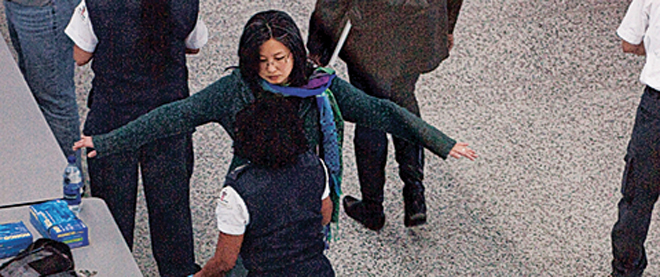Worried about terrorism? Not us.
A new poll shows that 10 years after 9/11, Canadians aren’t concerned about the threat of terrorism
Steve Payne/The New York Times/Redux
Share

Even though memories of 9/11 remain vivid for Canadians, the threat of terrorism is hardly at the top of our minds. An Innovative Research poll done for Maclean’s shows that 27.1 per cent of Canadians consider 9/11 to have been the most important international development of the last decade, ranking it just slightly higher than the credit crisis of 2008 (26.2 per cent) and well above other developments like climate change and the rise of the middle class in China and India. Which isn’t to say 9/11 has had a lasting impact on our national psyche. Asked to name the one issue that concerns them most, just 3.4 per cent of respondents identified the threat of terrorism. Indeed, Canadians are much more likely to be worried about the state of our health care system (19 per cent) and the potential for another recession (18.2 per cent) than they are of a repeat of 9/11.
That may be partly explained by the seemingly widespread perception among Canadians that terrorist attacks aren’t likely to affect them personally. If terrorist threats are to happen at all, Canadians believe they’ll target people other than themselves. Nearly eight in 10 Canadians say they’re either not very concerned or not concerned at all that someone they know could fall victim to a terrorist attack. A comparably meagre 3.9 per cent say they are very concerned about the possibility. The online poll had 1,066 respondents and a margin of error equivalent to plus or minus three per cent.
But Canadians have come to some firm conclusions about the fallout from 9/11. As a nation, we’ve grown particularly skeptical about the benefits of the two wars that followed the attacks. Canadians are twice as likely to say the war in Afghanistan made the world a more dangerous place as they are to say it made the world safer. The divide is even more stark when it comes to Iraq: Canadians are more than four times more likely to say the war in Iraq made the world more dangerous rather than safer.
“There’s a sense that the security apparatus around airports dropped the ball [on 9/11] and that fixing that would be a good way to stop it from happening again, not going to wars in distant lands,” says Greg Lyle, the managing director of Innovative Research. “If you want to prevent terrorism at home, the answer is better security at home.” Indeed, to most Canadians, 9/11 was at least in part a security failure, with 51 per cent saying the attacks could have been prevented with better surveillance. Moreover, they’ve grown accustomed to heightened airport security. Nearly two-thirds of respondents say it is critical to preventing future attacks.
But governments shouldn’t take that to mean Canadians would welcome law enforcement snooping in their private lives. Opposition to the monitoring of private phone calls (81.2 per cent), emails (83.2 per cent), and text messages (81.1 per cent) is as fierce as it is widespread. Even among those who say they are very concerned about the terrorist threat, a solid majority opposes increased surveillance of private communications.
The poll results suggest the federal government could have a fight on its hands when it comes time to push through its so-called “Lawful Access” legislation this fall, which would require Canada’s Internet service providers to hand over customer information to authorities without court orders and to conduct real-time surveillance of their networks. “People don’t like the concept of surveillance as the answer to this,” Lyle says. “If you are running a security apparatus in Canada, you’ve got to be frustrated by this because it says you’ve got a lot of work to do to earn the right to use some of the tools that might be pretty helpful to you.”